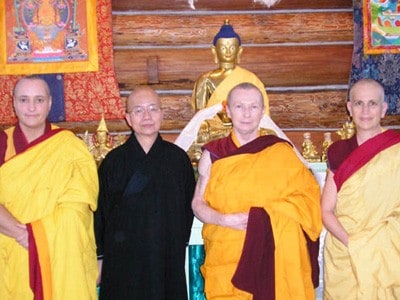Patience with the path
By J. H.

Private correspondence, September 2006.
How is my mind nowadays? Honestly, very disturbed as of late. My path has been a struggle, my practice has been difficult, my patience has been thin. I’ve been thoroughly afflicted. I expected it though. When you tear the scab off an old wound, it tends to be messy for a bit before it heals.
I wrote an article about shame that spurred me to start working with things from my past (childhood abuse, molestations, the rapes, etc.). It’s something that I’ve needed to do for a long time. It’s something I’m going to have to do if I want to prepare my mind for monastic life and the Vajrayana. If I want to get anywhere, I’m going to have to work with the unhealthy parts of my mind. Isn’t this what this path is all about anyway? Healing our minds until there is nothing left but the healthy aspect of compassion?
So, I’ve been revisiting past ghosts. It’s hard, and it triggers a lot of my old coping mechanisms (compulsive behaviors, anger, etc.). As a result my mind has been a mess; but my path is going well!
Seriously, my path is really good. I’m able to sit in this messy process with my little toolbox of Buddhist contemplations and just work on one thing at a time. It’s like pruning the hedges in the midst of a thunderstorm. It seems crazy, especially to an onlooker, but as long as I do what I am doing—trim the hedges when they need trimming, sun or rain—I make progress.
I guess that’s really been my lesson lately. I can’t change the world (it’s too big). I can’t stop the war in the Middle East. I can’t cure cancer. I can’t even stop the storm of emotions that blows from time to time. These things are too great. What I can do is work on one thought at a time. I can pick just one moment and work on that. By this process—one moment of work, one thought at a time—I will accomplish all those other things.
I guess you can say I’m learning a different kind of patience. I’m learning to be patient with the path. I’m not in a race anymore. I’m not concerned if I become a monk in this life, if I enter the Vajrayana soon. I’m not concerned if I get the book translated or not. I really don’t have Dharma goals anymore. They’ve been replaced by this process of, “Can I make my mind just a little bit better now than it was a moment ago?”
I know this might sound strange, but I know on some deeper level that this is correct. This process is the Dharma in a more authentic way. After all, robes and rituals don’t make Buddhas, pure minds do. By a process of purifying a mind, one won’t be able to avoid whatever is conducive to the path—bread will roll uphill to the yogi. The more I contemplate emptiness, the more things like this occur to me. I don’t have to change my world. By changing my mind, my world will change anyway.
It’s like far-reaching generosity (dana paramita). It’s a state of mind. It’s not developed by having fed all hungry beings. There are plenty of those left, even though many beings have perfected generosity. Far-reaching generosity is developed by renunciation and compassion.
To put it in another way, it is easy to worry about the vast number of beings who are poor. No sense being overwhelmed by that. It’s far better to be concerned with renouncing the things we do own, to give them to the beings we do know. It’s better to concern ourselves with the beings right in front of us, as opposed to the multitude in visualizations that remain abstract concepts in our mind.
If we never did anything more than have faith in the process (emptiness and karma) based on understanding, we would still develop generosity. If all we did was cultivate renunciation and then give whatever we did have to the beings we can reach in order to end their suffering, we would eventually have boundless ability to take care of all beings. By taking care of the beings in front of us—by taking little steps—we accomplish the great things.
So, my path has become one of little steps as of late. I’ll just be patient for just right now. I’ll be generous with just this piece of cake. I’ll remember that that one guy there was once my mother. All the rest will take care of itself. How do I know? Interdependent origination is infallible. Whatever we cultivate, it will grow.
Incarcerated people
Many incarcerated people from all over the United States correspond with Venerable Thubten Chodron and monastics from Sravasti Abbey. They offer great insights into how they are applying the Dharma and striving to be of benefit to themselves and others in even the most difficult of situations.


